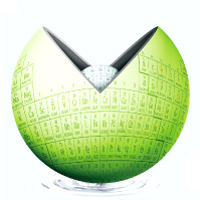
Published for geochemistry community from Geochemical Society of Japan.
Hydrogen and carbon isotope fractionation by thermophilic hydrogenotrophic methanogens from a deep aquifer under coculture with fermenters
Geochemical Journal, Vol. 46, No. 3, P. 193-200, 2012
ABSTRACT
To elucidate the isotope geochemistry of CH4 production in deep subsurface environments, we investigated the relation between H2 concentration and hydrogen and carbon isotope fractionation by CO2 reduction using microbial communities obtained from groundwater in a deep aquifer associated with an accretionary prism. Incubation experiments were conducted under anaerobic culture conditions of two types. In one experiment, a coculture of H2-producing fermenters and hydrogenotrophic methanogens was established in groundwater treated with organic substrates. The other experiment used groundwater under H2 + CO2 (80:20, v/v) to produce CH4 under high H2 concentrations. In the cocultures, H2 concentrations increased in the initial phases, then decreased gradually and remained low during CH4 production, indicating H2 consumption by hydrogenotrophic methanogens to produce CH4. This study revealed for the first time that cocultures with fermenters and hydrogenotrophic methanogens producing CH4 in low H2 concentration cause smaller hydrogen isotope fractionations (0.663 < αH < 0.725) than in monocultures under high H2 concentrations (0.629 < αH < 0.656). Carbon isotope fractionation in cocultures was greater (1.052 < α(CO2-CH4) < 1.074) than in monocultures under high H2 concentrations (1.021 < α(CO2-CH4) < 1.023). The large carbon fractionation was thought to result from low levels of H2, supporting the hypothesis of differential reversibility of multiple enzymatic processes in CH4 production. Although lack of agreement remains between results of incubation experiments and field observations especially in hydrogen isotope fractionations, both hydrogen and carbon isotope fractionation in cocultures were close to the fractionations of field observation in which CO2 reduction is a dominant pathway in CH4 production compared with those in monoculture.KEYWORDS
methane, isotope fractionation, hydrogenotrophic methanogen, syntrophic cooperation, hydrogen concentrationSupplementary Materials(file)
https://www.jstage.jst.go.jp/article/geochemj/46/3/46_1.0161/_supplement/_download/46_1.0161_1.pdf
- Published : 2012-06-20
- Released on J-STAGE : 2013/11/02
- Received : 2011/12/07
- Accepted : 2012/02/09
- DOI : https://doi.org/10.2343/geochemj.1.0161
- J-STAGE URL : https://www.jstage.jst.go.jp/article/geochemj/46/3/46_1.0161/_article/-char/ja
- J-Online ISSN: 1880-5973
- Print ISSN : 0016-7002
- ISSN-L : 0016-7002
All Issues
- Vol.59, 2025
- Vol.58, 2024
- Vol.57, 2023
- Vol.56, 2022
- Vol.55, 2021
- Vol.54, 2020
- Vol.53, 2019
- Vol.52, 2018
- Vol.51, 2017
- Vol.50, 2016
- Vol.49, 2015
- Vol.48, 2014
- Vol.47, 2013
- Vol.46, 2012
- Vol.45, 2011
- Vol.44, 2010
- Vol.43, 2009
- Vol.42, 2008
- Vol.41, 2007
- Vol.40, 2006
- Vol.39, 2005
- Vol.38, 2004
- Vol.37, 2003
- Vol.36, 2002
- Vol.35, 2001
- Vol.34, 2000
- Vol.33, 1999
- Vol.32, 1998
- Vol.31, 1997
- Vol.30, 1996
- Vol.29, 1995
- Vol.28, 1994
- Vol.27, 1993
- Vol.26, 1992
- Vol.25, 1991
- Vol.24, 1990
- Vol.23, 1989
- Vol.22, 1988
- Vol.21, 1987
- Vol.20, 1986
- Vol.19, 1985-1986
- Vol.18, 1984
- Vol.17, 1983
- Vol.16, 1982
- Vol.15, 1981
- Vol.14, 1980
- Vol.13, 1979
- Vol.12, 1978
- Vol.11, 1977
- Vol.10, 1976
- Vol.9, 1975
- Vol.8, 1974
- Vol.7, 1973
- Vol.6, 1972-1973
- Vol.5, 1971
- Vol.4, 1970-1971
- Vol.3, 1969-1970
- Vol.2, 1968
- Vol.1, 1966-1967
Current Issue:
Stats:
Impact Factor: 1.6 (2024)
Submission to final decision: 9.6 weeks (2022)




